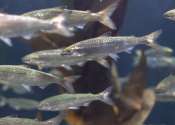New study finds bioluminescence more common than previously thought in deep‐sea shrimp
Scientists have discovered bioluminescence is actually pretty common among deep-sea shrimp, with a new study identifying 157 species that are believed to possess the ability to emit light. Some do it by vomiting luminous ...









